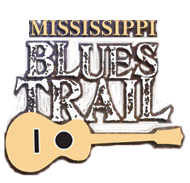Rufus Thomas
Rufus Thomas - Byhalia
A recording artist, disc jockey, comedian, and ambassador for Memphis music, Rufus Thomas (1917 – 2001) was born here in Cayce. As a young man Thomas toured with the Rabbit Foot Minstrels, and later worked in Memphis as an emcee at Beale Street’s Palace Theater and as an influential and long serving deejay on WDIA. Known as the “world’s oldest teenager,” Thomas recorded blues for Chess and Sun, and his many soul hits for Stax included “Walking the Dog.”
Rufus Thomas embodied the spirit of Memphis music perhaps more than any other artist, and from the early 1940s until his death on December 15, 2001, occupied many important roles in the local scene. Thomas was born in Cayce on March 26, 1917, and his family lived on Mt. Carmel Road before they moved to Memphis in about 1921. After graduation from Booker T. Washington High School in 1936 Thomas went out on the road with the Rabbit Foot Minstrels of Port Gibson, Mississippi, initially working as a tap dancer and later as a singer. He later became the host—together with partner Robert “Bones” Couch—of the popular amateur contest at Beale Street’s Palace Theater, where the most notable winner in the 1940s was a then-unknown B. B. King.
Thomas, who counted Louis Armstrong, Fats Waller and Gatemouth Moore as his most important musical influences, made his first recording for the Star Talent label around Christmas of 1949, followed by singles for Bullet, Chess, Sun, and Meteor. He scored the first hit for Sun, Sam Phillips’ new label, in 1953 with “Bear Cat,” an answer song to Big Mama Thornton’s “Hound Dog.” Thomas remained a prominent force in Memphis music via his popular Hoot ‘n’ Holler program at WDIA; his high school history teacher, Nat D. Williams, hired him on as a deejay in 1950. A second and more successful stage of Thomas’ recording career, as a soul singer, began in 1960, when he recorded “Cause I Love You,” a duet with his teenage daughter Carla, for the new Satellite label. A regional hit, it prompted a production and distribution deal with powerful Atlantic Records. Satellite soon changed its name to Stax, and over the next fifteen years Thomas scored multiple hits for the label including “The Dog,” “Walking the Dog,” “Do the Funky Chicken,” “Jump Back,” “The Breakdown,” and the No. 1 R&B hit “(Do the) Push and Pull,” recorded when the perennially young Thomas was 53. His later recordings included albums for Alligator, Avid, High Stacks, Sequel, and Ecko, and singles for Ichiban (“Rappin’ Rufus”), Erwin, Hi, and Artists of America.
In addition to his radio and recording career, Thomas provided for his family by working a full time job at the American Finishing Company textile firm from the early ‘40s until 1963. In the mid-1970s he left WDIA and worked a short while for WLOK, but returned to WDIA in 1986, hosting the popular “All Blues Show” together with Jay Michael Davis. Thomas, who gave a memorable performance in the 1973 concert film Wattstax, returned to the big screen for Jim Jarmusch’s 1989 Mystery Train and D. A. Pennebaker’s soul documentary Only the Strong Survive, which also featured Carla Thomas. Honors bestowed upon him include induction in the Blues Hall of Fame (2001), the naming of a Memphis street in his honor, and the creation of Rufus Thomas Park in Porretta, Italy, the site of a popular annual soul festival.
content © Mississippi Blues Commission
[ BACK TO TOP ]

